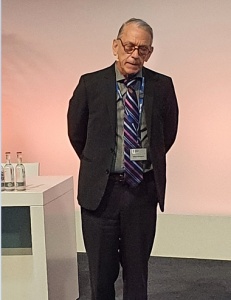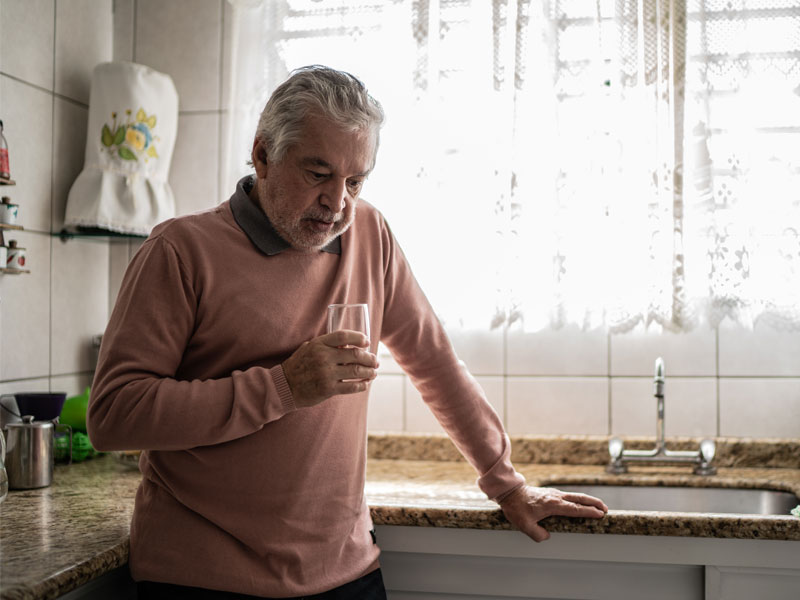Fatigue. Chronic fatigue. Can CoQ10 supplementation make a difference against fatigue, lethargy, tiredness?

Dr. William V. Judy (1938-2022), president of the SIBR Research Institute, managed clinical trials of CoQ10 treatment for patients with heart failure, chronic fatigue syndrome, and prostate cancer. Dr. Judy advocated for the use of CoQ10 supplementation with patients with low-energy syndromes.
The pooled data from 13 randomized controlled trials enrolling 1,126 study participants has shown that Coenzyme Q10, as compared with placebo, significantly reduces fatigue scores [Tsai 2022].
- The beneficial treatment effects of the CoQ10 supplementation were consistent in both healthy and diseased study participants.
- Increases in the daily dose of Coenzyme Q10 and in the duration of the CoQ10 treatment were both positively associated with greater fatigue reduction.
- There was only one adverse (gastrointestinal) event in the 602 study participants who had taken the CoQ10 supplements.
The authors of the 2022 meta-analysis concluded that Coenzyme Q10 is an effective and safe supplement for reducing fatigue symptoms [Tsai 2022].
How Does Coenzyme Q10 Relieve Fatigue?
There are several factors involved in chronic fatigue. There is evidence that CoQ10 supplementation addresses some of these factors, e.g., mitochondrial dysfunction, oxidative stress, chronic systemic inflammation [Tsai 2022].
- Mitochondrial dysfunction: The mitochondria – bean-shaped organelles in the cells – have several key functions in cell metabolism. The most important function is the generation of cellular ATP energy. Coenzyme Q10 is a key component in the mitochondrial electron transfer chain, which drives the process of cellular energy production [Hidalgo-Gutiérrez 2021].
- Oxidative stress: Coenzyme Q10 is a lipid-soluble antioxidant that works to inhibit oxidation of lipid-containing structures such as cellular membranes and lipoproteins. CoQ10 supplementation may also provide protection against oxidative damage to neurons, which is a factor in persistent fatigue [Aaseth 2021]. A 2020 meta-analysis of 19 clinical studies has shown that CoQ10 supplementation can reduce the levels of blood bio-markers of oxidative stress [Sangsefidi 2020].
- Chronic systemic inflammation: Fatigue is one part of the response to chronic inflammation [Omdal 2020]. A 2017 meta-analysis of 17 clinical studies showed that CoQ10 supplementation has significant lowering effects on the C-RP, IL-6, and TNF-α blood bio-markers of inflammation [Fan 2017].

In the landmark KiSel-10 study, Professor Urban Alehagen showed that combined Coenzyme Q10 and selenium supplementation improved heart function and reduced the levels of blood bio-markers for oxidative stress and inflammation.
The Safety of CoQ10 Supplementation
Coenzyme Q10 has a well-documented safety level of up to 1,200 mg/day per person [Hidaka 2008].
Pharmacokinetic studies indicate that CoQ10 supplementation does not affect the biosynthesis of endogenous Coenzyme Q10 and that Coenzyme Q10 does not accumulate in the plasma or the tissues after the cessation of
supplementation (Bhagavan and Chopra 2007].
Conclusion: Coenzyme Q10 Has a Fatigue Alleviating Effect
Tsai et al [2022] have shown that CoQ10 supplementation does have a fatigue alleviating effect and that the effect increases with increased daily dosage and with longer treatment duration.
There remains the question of whether the formulation and the bioavailability of the CoQ10 supplement plays a role in its fatigue reducing effect.
The formulation of the CoQ10 supplement is the decisive factor in the absorption and bioavailability of the substance: the manufacturer’s failure to solve the problem of CoQ10 crystal dissolution to single CoQ10 molecules can reduce bioavailability by 75% [Mantle & Dybring 2020].
Note: The human body cannot absorb CoQ10 crystals. It can absorb only single CoQ10 molecules.
Consequently, it is important to buy a CoQ10 supplement that has been formulated with the proper mix of carrier oils and that has been prepared using precise heating and cooling procedures [Lopez-Lluch 2019].
Buying a CoQ10 product without documented absorption and bioavailability will likely be a waste of money. Moreover, there is good reason to think that a well-formulated ubiquinone CoQ10 supplement will supply the body with significant quantities of the ubiquinol form of Coenzyme Q10 in the blood plasma and lipoproteins [Mantle & Dybring 2020].
Sources
Aaseth J, Alexander J, Alehagen U. Coenzyme Q10 supplementation – In ageing and disease. Mech Ageing Dev. 2021 Jul;197:111521.
Bhagavan HN, Chopra RK. Plasma coenzyme Q10 response to oral ingestion of coenzyme Q10 formulations. Mitochondrion. 2007 Jun;7 Suppl:S78-88.
Fan L, Feng Y, Chen GC, Qin LQ, Fu CL, Chen LH. Effects of coenzyme Q10 supplementation on inflammatory markers: A systematic review and meta-analysis of randomized controlled trials. Pharmacol Res. 2017 May;119:128-136.
Hidaka T, Fujii K, Funahashi I, Fukutomi N, Hosoe K. Safety assessment of coenzyme Q10 (CoQ10). Biofactors. 2008;32(1-4):199-208.
Hidalgo-Gutiérrez A, González-García P, Díaz-Casado ME, Barriocanal-Casado E, López-Herrador S, Quinzii CM, López LC. Metabolic targets of Coenzyme Q10 in mitochondria. Antioxidants (Basel). 2021 Mar 26;10(4):520.
López-Lluch G, Del Pozo-Cruz J, Sánchez-Cuesta A, Cortés-Rodríguez AB, Navas P. Bioavailability of coenzyme Q10 supplements depends on carrier lipids and solubilization. Nutrition. 2019 Jan;57:133-140.
D, Dybring A. Bioavailability of Coenzyme Q10: An Overview of the Absorption Process and Subsequent Metabolism. Antioxidants (Basel). 2020 May 5;9(5):386.
Omdal R. The biological basis of chronic fatigue: neuroinflammation and innate immunity. Curr Opin Neurol. 2020 Jun;33(3):391-396.
Sangsefidi, Z. S., Yaghoubi, F., Hajiahmadi, S., and Hosseinzadeh, M. The effect of Coenzyme Q10 supplementation on oxidative stress: a systematic review and meta-analysis of randomized controlled clinical trials. Food Sci. Nutr. 2020;8:1766–1776.
Tsai IC, Hsu CW, Chang CH, Tseng PT, Chang KV. Effectiveness of Coenzyme Q10 Supplementation for Reducing Fatigue: A Systematic Review and Meta-Analysis of Randomized Controlled Trials. Front Pharmacol. 2022 Aug 24;13:883251.
The information presented in this review article is not intended as medical advice and should not be used as such.
30 November 2022




Am about to try my first bottle of Co Q -10
Hi Sandra-
Think you will want to give the CoQ10 supplementation at least 12 weeks to show an effect, perhaps longer. Myself, I would try six months.
The absorption and the effect will depend, of course, on your choice of CoQ10 preparation. You need a product with documented effects, a product with the Coenzyme Q10 dissolved in carrier oils.
Please note too that Prof. Castro-Marrero and colleagues in Barcelona have shown good results by combining the Coenzyme Q10 with selenium and NADH.
Castro-Marrero J, Domingo JC, Cordobilla B, Ferrer R, Giralt M, Sanmartín-Sentañes R, Alegre-Martín J. Does Coenzyme Q10 Plus Selenium Supplementation Ameliorate Clinical Outcomes by Modulating Oxidative Stress and Inflammation in Individuals with Myalgic Encephalomyelitis/Chronic Fatigue Syndrome? Antioxid Redox Signal. 2022 Apr;36(10-12):729-739.
https://pubmed.ncbi.nlm.nih.gov/35229657/
Castro-Marrero J, Segundo MJ, Lacasa M, Martinez-Martinez A, Sentañes RS, Alegre-Martin J. Effect of Dietary Coenzyme Q10 Plus NADH Supplementation on Fatigue Perception and Health-Related Quality of Life in Individuals with Myalgic Encephalomyelitis/Chronic Fatigue Syndrome: A Prospective, Randomized, Double-Blind, Placebo-Controlled Trial. Nutrients. 2021 Jul 30;13(8):2658.
https://pubmed.ncbi.nlm.nih.gov/34444817/
By using the PubMed links I provide, you can find the full text of both articles.
Best wishes for 2024,
Richard
Hello. Years ago, it felt as though I was getting a pinch-like feeling in my heart, on occasion–it was a bit scary. As time went on, it occurred a bit more often. I looked up vitamins that might be beneficial for the heart, and I luckily came upon COQ10, so I started taking COQ10. Lucky me: It stopped the occasional pinch-like feelings right away.
Years after, I ran out of COQ10 and I did not take it for around a week or so. The pinches came back. That’s when I realized that the COQ10 did indeed help me. I have never stopped taking COQ10 again ( 100mg daily= 1 pill ), and strangely, any brand of COQ10 works for me .
My two questions are these: Is there any research about my above specific subject?
Is it well known in the medical field that COQ10 is successful with regard to what I stated above?
I am curious IF this is helpful information or if it is well known in the medical industry. Until this day, I do not know what the “pinch-like” feelings were an indication of! Thank you.
Dear Mary,
Thank you for your very informative comment. It will surely be of interest to other readers.
The pinching sensation that you have felt, has your doctor given it a name?
What you describe sounds somewhat like angina pectoris.
Perhaps you could ask your cardiologist if your pinching sensation is a variation of angina pectoris?
The definition that I see is: angina pectoris is the feeling of squeezing or heaviness or tightness in the chest.
In PubMed, I do find some reports about Coenzyme Q10 and angina pectoris. There is some documentation of CoQ10 deficiency in angina pectoris patients.
Kamikawa T, Kobayashi A, Yamashita T, Hayashi H, Yamazaki N. Effects of Coenzyme Q10 on exercise tolerance in chronic stable angina pectoris. Am J Cardiol. 1985 Aug 1;56(4):247-51.
Tran MT, Mitchell TM, Kennedy DT, Giles JT. Role of coenzyme Q10 in chronic heart failure, angina, and hypertension. Pharmacotherapy. 2001 Jul;21(7):797-806.
Hiasa Y, Ishida T, Maeda T, Iwano K, Aihara T, Bando M, Nakai Y, Kataoka Y, Mori H. [Effects of coenzyme Q10 injections on exercise tolerance in patients with stable angina pectoris]. Kokyu To Junkan. 1983 Apr;31(4):419-23. Japanese.
Best regards,
Richard